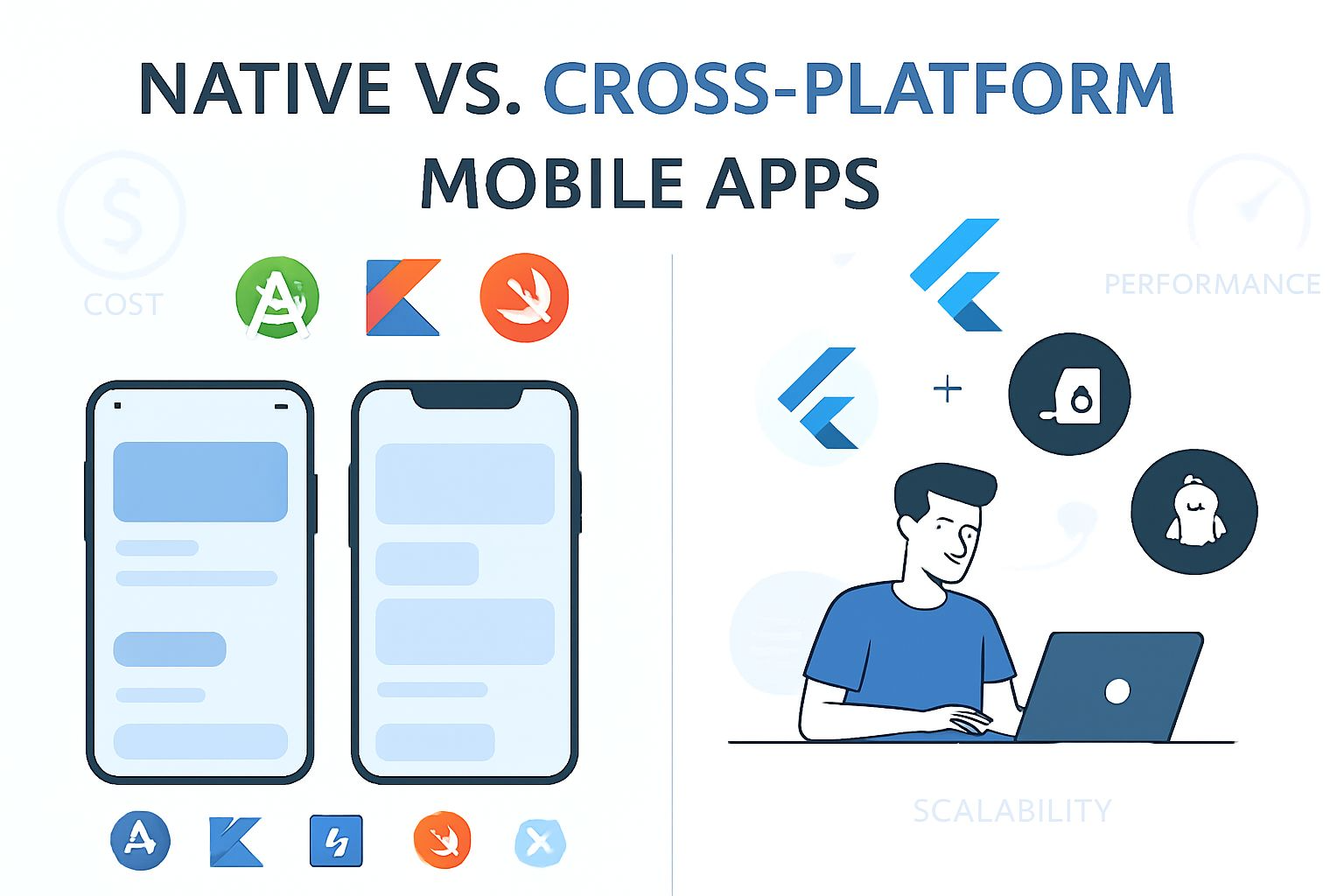
Mobile Apps in today’s fast-paced digital world are no longer a luxury—it’s a necessity. But one of the most crucial decisions business owners face during mobile app development is choosing between native and cross-platform development.
This decision impacts everything from your development cost and launch timeline to long-term scalability and app performance. With the rise of modern frameworks like Flutter, cross-platform development has become more powerful than ever. But how does it stack up against tried-and-tested native app development?
In this blog, we’ll explore the key differences between native and cross-platform mobile apps, compare Flutter with native development, and help you make the best choice for your business based on budget, performance, and scalability.
What Is Native Mobile App Development?
Native development involves building mobile apps separately for each platform—Android and iOS—using the official languages and tools provided by the platform vendors.
- Android: Developed using Java or Kotlin with Android Studio.
- iOS: Developed using Swift or Objective-C with Xcode.
Since native apps are built specifically for a single platform, they deliver optimal performance, seamless UX, and better access to hardware features.
What Is Cross-Platform Mobile App Development?
Cross-platform development allows developers to write a single codebase that works on both iOS and Android platforms. Frameworks like Flutter, React Native, and Xamarin make this possible.
Among these, Flutter, developed by Google, stands out for its performance, UI flexibility, and growing community. Apps built with Flutter are compiled to native ARM code, ensuring near-native performance.
Flutter vs. Native Development: A Detailed Comparison
Let’s break down the comparison based on key business factors:
1. Development Cost
- Flutter (Cross-Platform):
✅ You need only one development team and one codebase.
✅ Reduces cost by up to 40–50% compared to native apps.
✅ Faster MVP (Minimum Viable Product) delivery. - Native Development:
❌ Requires two separate teams—one for Android and one for iOS.
❌ Increases development and maintenance costs significantly.
Verdict: If you’re a startup or SME with a tight budget, Flutter is more cost-effective.
2. Performance
- Native:
✅ Offers best-in-class performance and seamless UI/UX.
✅ Ideal for apps requiring high-end graphics, real-time features, or complex animations (e.g., gaming apps, fintech apps).
✅ Direct access to device hardware and OS features. - Flutter:
✅ Provides near-native performance by compiling to native code.
✅ Flutter’s Skia engine redraws UI at 60fps or even 120fps on supported devices.
❌ Slight performance differences may be noticeable in intensive apps.
Verdict: For top-tier performance and responsiveness, native development still leads—but Flutter is close behind.
3. Time to Market
- Flutter:
✅ Faster development due to a single codebase.
✅ Hot reload feature speeds up testing and UI iterations.
✅ Ideal for quick prototyping and launching MVPs. - Native:
❌ Slower development due to separate codebases.
❌ UI changes and testing take longer.
Verdict: Flutter is a winner for businesses aiming to launch apps quickly.
4. Scalability and Maintenance
- Flutter:
✅ Easy to scale for both platforms simultaneously.
✅ Easier maintenance—one update applies to both platforms.
❌ Third-party plugin support is growing, but still behind native in some niche use cases. - Native:
✅ Platform-specific scalability and customization.
✅ Better long-term support and compatibility with OS updates.
❌ Double the maintenance workload.
Verdict: Flutter is ideal for fast-growing apps with moderate complexity, while native is preferred for enterprise-grade scalability.
5. User Experience (UX) & User Interface (UI)
- Native:
✅ Access to platform-specific UI components.
✅ Best for apps where platform-specific UI consistency is key (e.g., Apple Human Interface Guidelines). - Flutter:
✅ Offers beautiful, customizable UI with Material Design and Cupertino widgets.
✅ Can mimic native UI components, but may not feel 100% native.
Verdict: Native apps deliver a slightly superior UX, but Flutter’s UI flexibility is excellent for custom branding.
6. Access to Native APIs and Hardware
- Native:
✅ Full access to all device capabilities (camera, GPS, biometrics, sensors).
✅ Seamless integration with platform-specific APIs and SDKs. - Flutter:
✅ Access via platform channels, plugins, or custom native code.
❌ May require writing native code for complex features.
Verdict: For hardware-intensive apps, native development gives more direct and stable access.
When Should You Choose Flutter?
You should go with Flutter (cross-platform) if:
- You want to reduce development costs.
- You need to launch your app quickly.
- You’re building an MVP or proof of concept.
- Your app does not require highly complex native functionalities.
- You want a consistent UI across both platforms.
Popular Apps Built with Flutter:
Google Ads, Alibaba, BMW, eBay Motors, and Reflectly.
When Should You Choose Native Development?
Opt for native development if:
- You’re building performance-critical apps (e.g., games, streaming platforms).
- You need deep integration with device hardware.
- Your business targets enterprise-level scalability and advanced features.
- You want platform-specific UI consistency.
- You have the budget to maintain two codebases.
Final Verdict: What’s Best for Your Business?
Choosing between native and cross-platform app development depends on your goals, budget, and long-term plans. Here’s a quick summary:
| Factor | Flutter (Cross-Platform) | Native Development |
|---|---|---|
| Development Cost | ✅ Lower | ❌ Higher |
| Performance | ⚠️ Near-native | ✅ Best |
| Time to Market | ✅ Faster | ❌ Slower |
| Maintenance | ✅ Easier (1 codebase) | ❌ Complex (2 codebases) |
| Scalability | ✅ Good | ✅ Excellent |
| Native Features | ⚠️ Needs bridging | ✅ Full access |
| UI/UX Consistency | ✅ Customizable | ✅ Platform-perfect |
If you’re unsure, a hybrid approach may also work. Start with Flutter for a quick launch and validate your idea. If needed, shift to native development as your app scales.
Need Help Building the Right Mobile App?
At Plutonic Services Private Limited, we help businesses like yours make the right tech choices. Whether you want to build a scalable Flutter app or go full-native for enterprise-grade performance, our expert team delivers tailored mobile solutions.
🚀 Let’s build your next big mobile app idea together.
📞 Contact us today at https://plutonic.co.in



